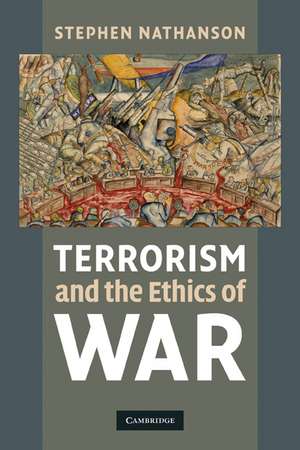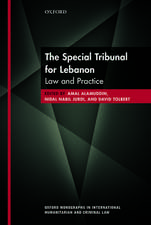Terrorism and the Ethics of War
Autor Stephen Nathansonen Limba Engleză Paperback – 12 mai 2010
| Toate formatele și edițiile | Preț | Express |
|---|---|---|
| Paperback (1) | 216.52 lei 6-8 săpt. | |
| Cambridge University Press – 12 mai 2010 | 216.52 lei 6-8 săpt. | |
| Hardback (1) | 558.96 lei 6-8 săpt. | |
| Cambridge University Press – 12 mai 2010 | 558.96 lei 6-8 săpt. |
Preț: 216.52 lei
Nou
Puncte Express: 325
Preț estimativ în valută:
41.43€ • 43.37$ • 34.28£
41.43€ • 43.37$ • 34.28£
Carte tipărită la comandă
Livrare economică 07-21 aprilie
Preluare comenzi: 021 569.72.76
Specificații
ISBN-13: 9780521137164
ISBN-10: 0521137160
Pagini: 328
Ilustrații: 6 tables
Dimensiuni: 152 x 228 x 15 mm
Greutate: 0.52 kg
Editura: Cambridge University Press
Colecția Cambridge University Press
Locul publicării:Cambridge, United Kingdom
ISBN-10: 0521137160
Pagini: 328
Ilustrații: 6 tables
Dimensiuni: 152 x 228 x 15 mm
Greutate: 0.52 kg
Editura: Cambridge University Press
Colecția Cambridge University Press
Locul publicării:Cambridge, United Kingdom
Cuprins
Introduction; Part I. Terrorism: What's in a Name?: 1. The problem of defining terrorism; 2. Defining terrorism; 3. What makes terrorism wrong?; 4. Innocence and discrimination; 5. 'Who dun it' definitions of terrorism; Conclusion: taking stock; Part II. Why Moral Condemnations of Terrorism Lack Credibility: Introduction: toward morally credible condemnations of terrorism; 6. Why standard theories fail to condemn terrorism; 7. Just war theory and the problem of collateral damage; Conclusion: categorical vs. conditional criticisms of terrorism; Part III. Defending Noncombatant Immunity: Introduction: the ethics of war-fighting: a spectrum of possible views; 8. The realist challenge to the ethics of war; 9. An ethic of war for reasonable realists; 10. Walzer on noncombatant immunity as a human right; 11. The supreme emergency exception; 12. Rights theories, utilitarianism, and the killing of civilians; 13. Immunity rights vs. the right of self-defense; 14. A rule utilitarian defense of noncombatant immunity; 15. Why utilitarian criticisms of noncombatant immunity are mistaken; 16. Is noncombatant immunity a 'mere' convention?; Part IV. How Much Immunity Should Noncombatants Have?: Introduction: the problem of collateral damage; 17. The problem of collateral damage killings; 18. The ethics of collateral damage killings; Conclusion: terrorism and the ethics of war; Bibliography; Index.
Recenzii
'In this carefully argued work, Stephen Nathanson has brought together two areas, terrorism and the ethics of war, too often treated separately. The result is new moral clarity and insight in both areas, especially regarding the moral treatment due to civilians by purveyors of military violence. This work is particularly valuable for those seeking a moral understanding of terrorism and an appreciation of what they must do to make their condemnation of terrorism morally credible.' Steven Lee, Hobart and William Smith Colleges, New York
Notă biografică
Descriere
This book provides an analysis of what makes terrorism morally wrong, and a rule-utilitarian defence of noncombatant immunity.










